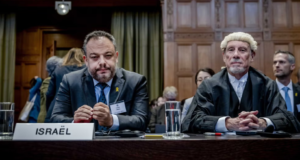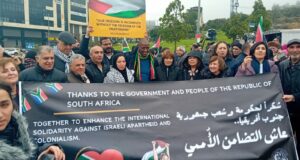Indymedia UK, 9th of October 2006

As the Lebanese people are reeling from Israel’s illegal bombing campaign, and the people of the West Bank and Gaza are suffering a continuous onslaught by the Israeli military, the Palestine Solidarity Campaign (PSC) and the Boycott Israeli Goods Campaign (BIG) activists joined a nationwide Boycott Day of Action against Israel on 7 October, 2006. A similar day of action was organised on 24 June, 2006, and a further day of action was held by the Irish Palestine Solidarity Campaign.
During the day of action, pickets and demonstrations took place at stores selling Israeli products across the UK. Concerned individuals took part in creative actions to persuade the public not to buy Israeli goods and demand that retailers do not stock them. Pickets, street theatre and demonstrations took place in Bradford, Camden, Whitechapel, Hackney, Brighton, East London, Oxford, Slough, Cambridge, Halifax, Exeter, Brent, Cardiff, Reading and Leeds.
The actions today were part of a concerted campaign calling for boycott, divestment and sanctions against apartheid Israel. Prevous actions and campaigns include:
Agrexco: Blockade of Israeli Company Carmel-Agrexco | Corporate Complicity in the Ethnic Cleansing of the Jordan Valley | Letting Apartheid Bloom | The Uxbridge Seven: Day One | Day Two | Seven Blockaders Acquitted
Caterpillar: Caterpillar Manchester Protest 2005 | Anniversary of Rachel Corries’ Death | Film: Caterkiller Shut Down | Anti Caterpillar Motorcade | Rhythms of Resistance Anti Cat Shoes Protest | Caterpillar Trade Fair Action | Caterkiller Awarded Housewrecker of the Year | ESF Florence Action
Supermarket protests: Boycott Van | Marks and Spencers Stencilled | Repression of M&S Protesters
Academic boycott: AUT Boycott | NAFTHE Boycott | CUPE Ontario | COSATU (South Africa).
The PSC and the BIG campaign are responding to calls from Palestine and calling for a boycott of Israel until it complies with international law and universal principles of human rights. On 9 June, 2005, a coalition of Palestinian Civil Society Organisations issued a “call for boycott, divestment and sanctions against Israel until it complies with international law’.
Over the summer, the movement for a boycott of apartheid Israel has been gathering momentum. Concerned individuals have taken action to show their anger over Israeli actions in Lebanon and the occupied territories. Many activists have targeted the supply of arms to Israel by invading bases being used to transport weapons components to Israel or taking action against arms companies dealing with Israel. In Derry, during the bombing of Lebanon, activists broke into US arms manufacturer Raytheon’s main office burning thousands of documents, while in Brighton protesters have caused major disruption to EDO MBM, supplier of electrical weapons components to Israel, throughout the summer.
Since the bombing of Lebanon began in June this year, Palestinians have renewed calls for a cultural boycott of apartheid Israel. Several international film festivals, including those at Lussass and Edinburgh have handed back Israeli embassy sponsorship. On 19 September, the Irish group, Academics for Justice, followed in the footsteps of British academic trade unions NAFTHE and the AUT and called for an academic boycott of apartheid Israel.
In addition to its brutal occupation and theft of Palestinian land, the Israeli state also operates an entrenched system of racial discrimination against its own Palestinian civilians, which is, among the reasons, why many South African activists label it an apartheid state.
Israel occupied the West Bank, Gaza Strip and Golan Heights in 1967 in contravention international law. Since then, Israel has moved over 380,000 settlers into these occupied territories in contravention of the Fourth Geneva Convention (article 49), the Hague Regulations and United Nations Security Council Resolutions.
Israel continues to build an illegal apartheid wall inside the West Bank despite the Advisory Ruling of the International Court of Justice in 2005 that the wall is illegal. Fifty five illegal Israeli settlements will be on the Israeli side of the wall separated from the West Bank.
Since 2000, Israel has demolished 628 Palestinian houses, home to 3,983 people, in acts of collective punishment. These demolitions constitute a war crime. 3,808 Palestinians have been killed as a direct result of Israeli military actions and 29,456 injured during the current upraising, which began in September 2000 (above statistics confirmed by the Israeli human rights group Btselem).
 International Solidarity Movement Nonviolence. Justice. Freedom.
International Solidarity Movement Nonviolence. Justice. Freedom.


